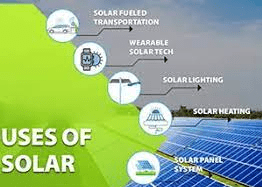Harnessing the Power of Solar Energy for a Sustainable Future
In an era marked by climate change concerns and a growing emphasis on sustainability, the utilization of solar energy has emerged as a beacon of hope for a greener and more eco-friendly future. Solar energy, derived from the sun’s abundant and renewable source of power, has the potential to revolutionize the way we generate electricity and reduce our carbon footprint. In this article, we delve deep into the myriad benefits and applications of solar energy, shedding light on how this remarkable technology can pave the way for a brighter, cleaner, and more sustainable world.

Understanding Solar Energy
Solar energy, often referred to as photovoltaic energy, is generated by capturing the sun’s rays and converting them into electricity. This process is made possible through the use of solar panels, which are composed of solar cells that contain semiconductors. When sunlight hits these cells, it excites the electrons within, generating an electric current. This electricity can then be harnessed to power homes, businesses, and even entire cities.
The Advantages of Solar Energy
1. Clean and Renewable
One of the most significant advantages of solar energy is its renewability. Unlike fossil fuels, which are finite resources and contribute to harmful greenhouse gas emissions, solar energy is an abundant and clean source of power. As long as the sun continues to shine, we have a virtually limitless supply of energy at our disposal.
2. Reduced Energy Bills
By investing in solar panels for your home or business, you can significantly reduce your energy bills. Solar energy systems allow you to generate your electricity, reducing your reliance on traditional power grids. This translates into substantial long-term savings.
3. Environmentally Friendly
Solar energy is environmentally friendly and plays a pivotal role in combating climate change. The generation of electricity from solar panels produces zero emissions, making it a crucial tool in reducing our carbon footprint and mitigating the effects of global warming.
4. Energy Independence
Solar power grants individuals and communities energy independence. By producing your electricity, you become less reliant on external energy providers, thereby ensuring a stable and secure energy supply.
Applications of Solar Energy
1. Residential Solar Panels
Installing solar panels on rooftops has become increasingly popular among homeowners. These residential solar panels not only reduce electricity bills but also contribute excess energy back to the grid, earning homeowners valuable credits.
2. Solar-Powered Transportation
Solar energy isn’t limited to stationary applications. Solar-powered vehicles are gaining traction in the automotive industry. From solar-powered cars to buses and even planes, this technology is driving innovation towards a greener future.
3. Solar Farms
Large-scale solar farms harness the sun’s energy to generate electricity for entire communities. These vast arrays of solar panels can provide power to thousands of homes and businesses simultaneously.
The Future of Solar Energy
As technology continues to advance, so too will the capabilities and efficiency of solar energy systems. Scientists and engineers are constantly working on developing more efficient solar cells, innovative storage solutions, and cost-effective installation methods. With these advancements, solar energy is poised to become an even more dominant player in the global energy landscape.
Conclusion
In a world facing environmental challenges, harnessing the power of solar energy is not just an option but a necessity. The advantages of solar energy, from its renewability to its contribution to reducing energy bills and combating climate change, make it a clear choice for a sustainable future. As we continue to invest in solar technology and explore new applications, we take a significant step towards a cleaner, greener, and more eco-conscious world.

you need to explore more then visit here

